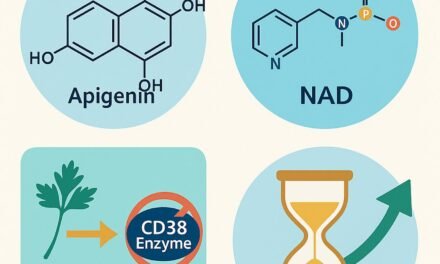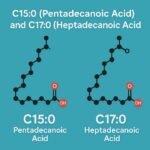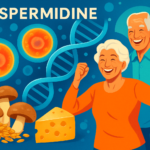Apigenin:
Apigenin is a natural product classified as a flavone, specifically 4′,5,7-trihydroxyflavone, and is the aglycone of various naturally occurring glycosides. It is a yellow crystalline solid commonly used for dyeing wool. This compound is abundantly found in fruits and vegetables, with parsley, celery, celeriac, and chamomile tea being common sources. Chamomile flowers contain a significant amount of apigenin, constituting 68% of total flavonoids. Apigenin is abundant in vegetables, citrus fruits, herbs, tea, and wine, In terms of pharmacology, apigenin competitively binds to the benzodiazepine site on GABAA receptors.
Apigenin has various health-promoting effects and is considered a nutraceutical or supplement due to its benefits. It can be recovered from alternative sources like macro- and microalgae and agro-food waste using environmentally friendly technologies such as enzymatic treatment and supercritical CO2 extraction. Studies have shown that apigenin has potential therapeutic benefits through in vivo research.
In foods, apigenin can be found in relatively high amounts in products like parsley, celery hearts, and raw rutabagas. It is also present in chamomile tea and various fruits and vegetables. The compound is known for its ability to reduce anxiety, affect immune health, modulate hormones, and has been studied for its potential therapeutic properties.
Potential Health Benefits of Apigenin:
Apigenin, a flavonoid found in various fruits, vegetables, and herbs like chamomile tea, offers a range of potential health benefits as supported by multiple studies:
- Reduced Inflammation: Apigenin has anti-inflammatory properties that can help reduce inflammation in the body.
- Reduced Risk of Cancer: Studies suggest that apigenin exhibits anticarcinogenic properties and may play a role in preventing cancer development.
- Enhanced NAD Levels: Apigenin has been linked to enhanced NAD levels, which are crucial for cellular health and longevity..
- Relief from Anxiety and Depression: This flavonoid is known for its calming effects and has been shown to reduce anxiety, lower cortisol levels, and improve symptoms of depression.
- Supports Heart Health: Apigenin supports cardiovascular health by reducing blood pressure, inflammation, and protecting against heart damage.
- Boosts Brain Function: Research indicates that apigenin has neuroprotective effects, enhances cognition, improves memory, and suppresses inflammatory mediators in the brain.
- Aids Sleep: Apigenin’s sedative effects can help promote relaxation and improve sleep quality.
- Potential Treatment for Autoimmune Diseases: Studies suggest that apigenin may help alleviate symptoms of autoimmune diseases by modulating immune responses and reducing inflammation.
- Pain Reduction: Due to its anti-inflammatory effects, apigenin can help reduce pain associated with various inflammatory conditions.
- Diabetes Management: Animal studies indicate that apigenin may improve insulin resistance and glucose tolerance, making it potentially beneficial for individuals with diabetes..
- Potential Testosterone Increase: Lab studies suggest that apigenin may play a role in testosterone synthesis and could have implications for hormone balance4.
Dosage:
The recommended dosage of apigenin can vary based on different sources and intended benefits:
- Studies suggest that the daily intake of apigenin typically ranges from 0.69 to three milligrams per day.
- For optimal sleep support and stress management, Neurogan Health recommends taking two tablets, providing a total serving of 200 mg of apigenin.
- Apigenin is commonly available in 50 mg pills, with this dosage being a standard form for consumption.
It is essential to consult with a healthcare professional before starting any new supplement regimen to determine the appropriate dosage based on individual health needs and considerations.
Side Effects of Apigenin Supplements:
Taking apigenin supplements may lead to some side effects, although they are generally mild. Here are the potential side effects associated with apigenin supplementation:
- Possible Allergy: Some individuals may experience allergies to foods containing apigenin, leading to symptoms like upset stomach.
- Gastrointestinal Issues: Upset stomach is a common side effect associated with higher doses of apigenin supplements.
- Skin Irritations: Topical products containing apigenin may cause skin irritations in some individuals, so it is important to discontinue use if adverse reactions occur.
- Drug Interactions: Apigenin can interact with certain medications, particularly cyclosporine, warfarin, and some chemotherapy drugs, potentially affecting their effectiveness.
- Sedative Effects: Higher doses of apigenin can induce muscle relaxation and sedation, which may impact individuals differently based on their tolerance levels.
- Caution with Sedatives: Individuals taking sedatives like alcohol or certain antidepressants should be cautious when using apigenin supplements as it may enhance the effects of these medications.
- Long-Term Effects: The long-term effects of apigenin supplementation are still being studied, and caution is advised when taking high-potency supplements for extended periods due to the lack of comprehensive data on long-term use..
It is crucial to consult with a healthcare provider before starting apigenin supplementation, especially if you have any existing medical conditions or are taking prescription medications to avoid potential interactions and side effects.










